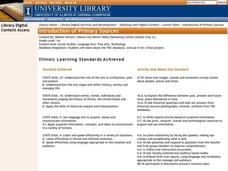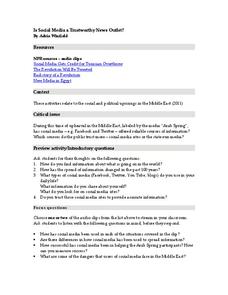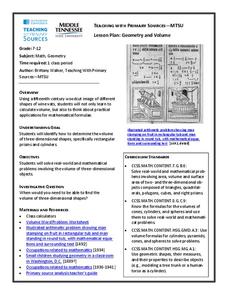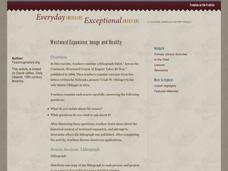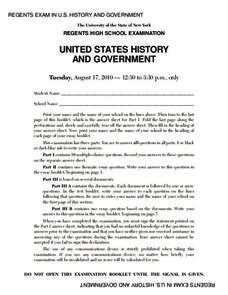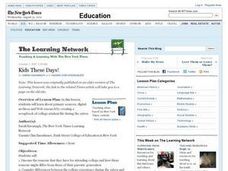Curated OER
Sources of Information
For this sources of information study guide worksheet, students read a brief overview pertaining primary and secondary sources and then respond to a reflection question.
Curated OER
Learning from Primary Source Documents One Day at a Time
Students differentiate between primary and secondary research sources before making a visual representation of their research into the colonist of Fort St. Louis. They write inquiry questions to guide their research.
Curated OER
Using Primary Documents: The 1906 San Francisco Earthquake
Students examine primary documents from various key historical events, including those from the 1906 San Francisco earthquake. They discuss the importance of such documents.
Curated OER
Introduction of Primary Sources: Introduction to TDC site (Lesson 3)
First graders are introduced to using a database as a primary source. Using the internet, they choose a site of artifacts and practice navigating through the site. They identify an artifact and draw them on a large piece of white...
Curated OER
Introduction of Primary Sources
First graders examine a database to explain the use of primary source documents.
Curated OER
Comparing Fossil Fuels and Renewable Energy Sources
In this energy worksheet, students will complete a Venn diagram comparing and contrasting fossil fuels and renewable energy sources.
Wild BC
Greenhouse Gas Line-Up
Discuss different sources of energy and how much greenhouse gas each might emit. The six sources are then ranked according to emissions from greatest to least. Finally, the true cumulative emissions are revealed to show the class how...
University of North Carolina
Annotated Bibliographies
When researchers write a paper, they become curators of information. It's their job to determine the best sources of information on a topic and use those sources to inform their writing. As part of a larger series, a handout on annotated...
National History Day
Challenging the Status Quo: Women in the World War I Military
Why are some so resistant to change? The status quo is often to blame for a lack of forward movement in society. Following the events of World War I, women in America suddenly had a voice—and were going to use it. Scholars use the...
Curated OER
Is Social Media a Trustworthy News Outlet?
Examine the role of social media in social and political uprisings. Pupils listen to NPR audio clips about social media and the Arab Spring and read an article that proposes the idea that revolution will not happen through social media....
New York State Education Department
Global History and Geography Examination: January 2011
Using primary and secondary sources—including classics such as the Communist Manifesto—class members consider the effects of these ideas on the course of history. Another essay prompt explores geography and history, while multiple-choice...
Middle Tennessee State University
Preparing for Revolution
Class members create a timeline of actions by both the British parliament and the colonists that led to the outbreak of the American Revolution. Groups use the provided Primary Source Analysis Tool to examine and...
Virginia Department of Education
Geometry and Volume
The history of math is fascinating! Utilize a woodcut primary source image from 1492 and posters from the 1930s to help geometers apply their volume-calculation skills to real-life questions.
Roy Rosenzweig Center for History and New Media
Westward Expansion: Image and Reality
As your young historians study Westward Expansion, practice in-depth primary source analysis with the documents and guidelines presented in this resource. They will examine a lithograph and excerpts from two letters written by a Nebraska...
University of Chicago
Using Artifacts for Clues About Identity
Learn about the ancient Near East through a close examination of ancient artifacts. Lead your class into analysis by first observing an artifact as a class. Pupils can then work in pairs to analyze the other artifacts and compile a list...
PBS
Broadcast News
Just because a story is on the news doesn't mean it's being presented fairly. Analyze news broadcasts with a lesson focused on evaluating television journalism. At home, kids watch a news show and note the stories presented, including...
New York State Education Department
US History and Government Examination: August 2010
Geography has played a complex role in America history. The Atlantic Ocean has served as a buffer to protect the United States from European Wars, but its proximity to Cuba, however, left it vulnerable to nuclear war during the Cuban...
National Woman's History Museum
Defying British Rule: Women's Contributions to The American Revolution
Primary and secondary sources are the focus of a lesson that showcases the important role women played during the American Revolution. Pairs review sources and discuss their findings. A close-reading of an informational text leads the...
Smithsonian Institution
The Suffragist: Educator's Guide for Classroom Video
Class members take on the role of historical investigators to determine why it took 40 years for women in the United States to get the right to vote. Sleuths view videos and analyze primary sources and images to gather evidence to answer...
Curated OER
The Greenhouse Effect
Why does it get so hot inside of our cars in the summertime? The greenhouse effect! Lab groups experiment to see what happens to an ice cube enclosed in a jar and placed in sunlight as compared to an ice cube outside of the jar. They...
Curated OER
Kids These Days!
Young scholars create a scrapbook of college student life during the 1960's using digital archives and Internet research. They read and discuss the article "What's the Matter With College?" and then compare college experience of today...
Curated OER
Jeffersonianism at the Bar
Eleventh graders participate in a political roundtable discussion. In this Jeffersonianism lesson, 11th graders role play individuals from the 19th century and discuss issues of the Federalist period.
Alabama Department of Archives and History
Conflict in Alabama in the 1830s: Native Americans, Settlers, and Government
To better understand the Indian Removal Act of 1830, class members examine primary source documents including letters written by Alabama governors and the Cherokee chiefs. The instructional activity is part of a unit on the expansion of...
PBS
Evaluating Conflicting Evidence: Sultana
What sunk the Sultana? Scholars become investigators to uncover the facts behind the 1865 sinking just after the end of the Civil War. Through group work, videos, and primary documents, they research and analyze why 1,800 men died....
Other popular searches
- Primary Sources
- Alternative Energy
- Primary and Secondary Sources
- Energy Resources
- Energy Sources
- Light Sources
- Water Sources
- Sources of Water Pollution
- Citing Sources
- Primary Resources
- Alternative Energy Sources
- Alternative Fuels




